
- Details
- Category: Learn
1. W3Schools – “SQL Tutorial”
W3Schools claims to be the largest web developer site on the Internet. It provides various tutorials and references on web development languages such as HTML, CSS, JavaScript, PHP, SQL, and JQuery, covering most aspects of web programming.

2. Codecademy – “Learn SQL”
Codecademy is an online platform that offers a wide range of free coding courses in programming languages like HTML, JavaScript, jQuery, PHP, Python, and Ruby. In addition to these courses, Codecademy’s students can learn how to manage data with SQL.
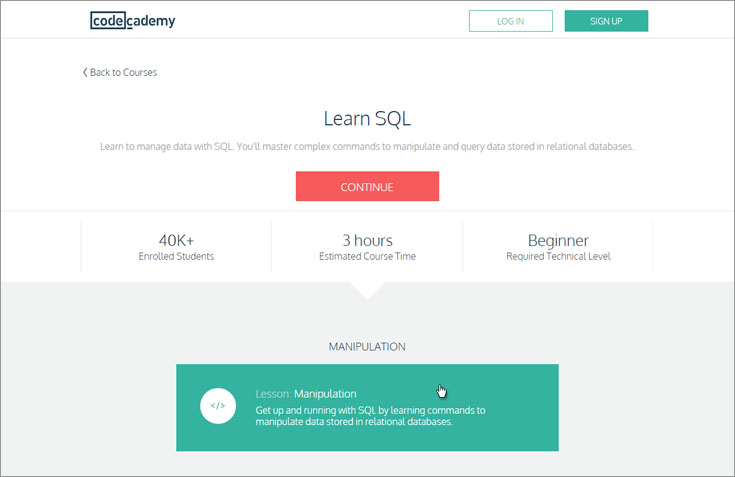
3-1keydata
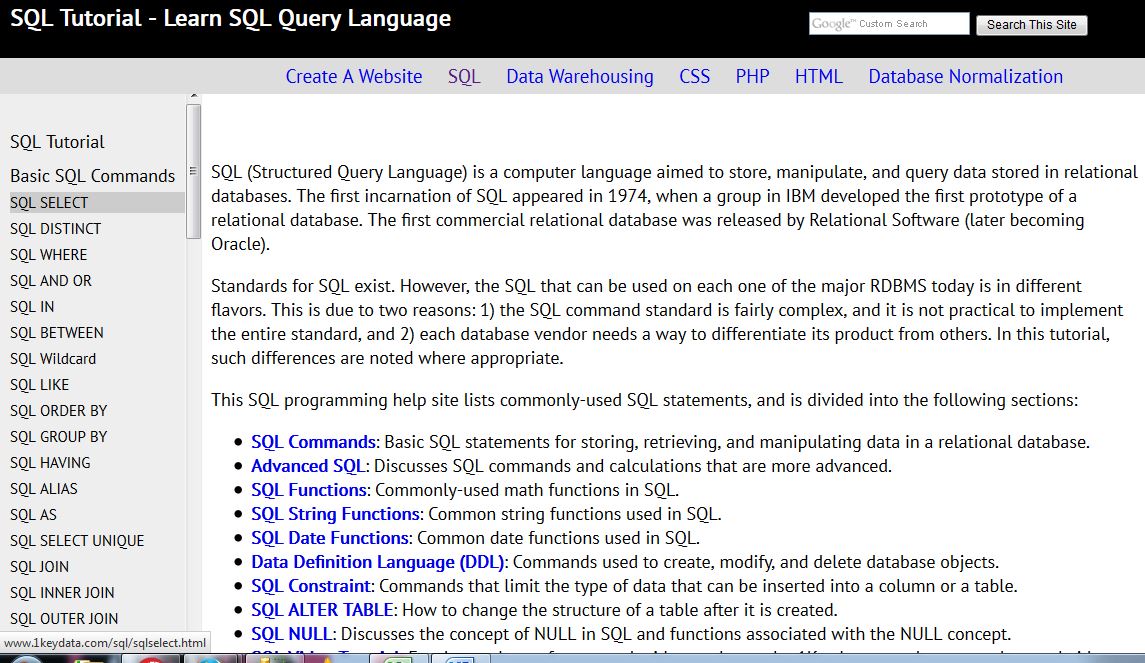
4. Khan Academy – “Intro to SQL”
Khan Academy provides its users with micro-lectures in the form of YouTube videos, lots of practice exercises, and a personalized learning dashboard. Combined, these tools empower learners to study at their own pace inside and outside of the classroom.
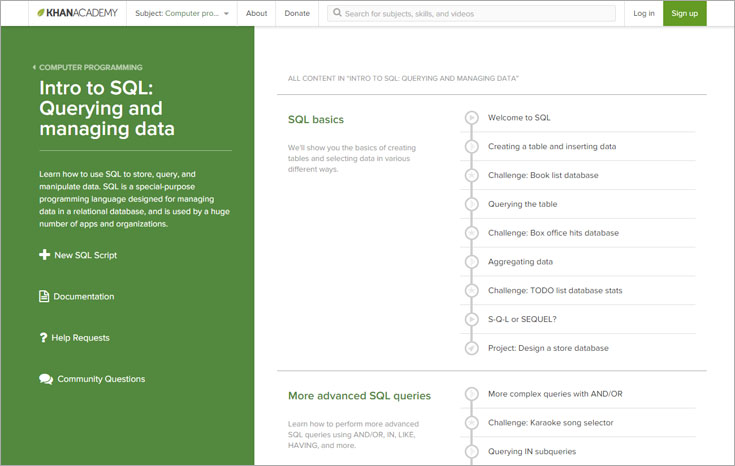
5. SQLZoo
SQLZoo is a nice free and interactive SQL tutorial developed and maintained by Edinburgh Napier University.
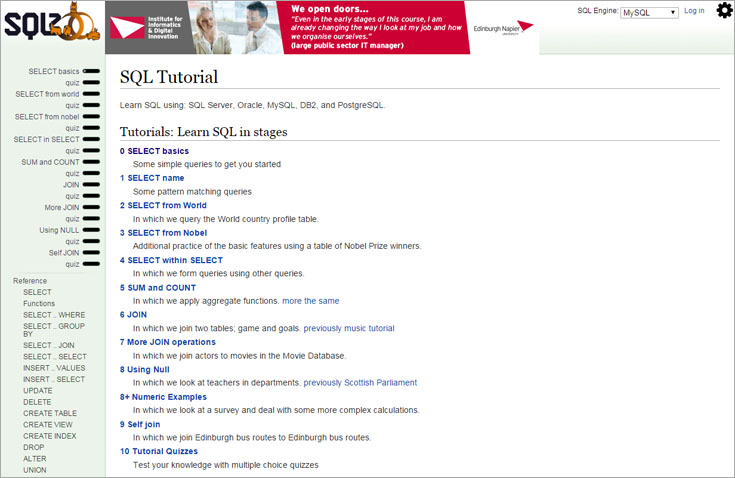
6. Tutorials Point – “Learn SQL”
Tutorials Point claims to be the web’s largest library of tutorials. Indeed, it offers dozens of online courses in computer engineering, information technology, programming languages, and management.
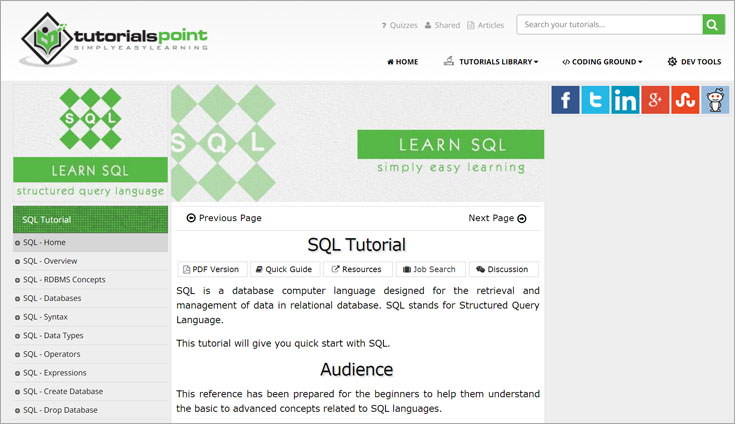
7. Udacity – “Intro to Relational Databases”
Udacity offers interactive online courses aimed at advancing academic and vocational skills. Although Udacity is profit-oriented, some courses are available for free.

8. SQL Problems and Solutions
SQL Problems and Solutions is an interactive textbook which lets you visualize tables and execute queries against a sample database. The tutorial explains the basic concepts and constructs of SQL and provides examples at various levels of expertise.

9. Tuts+ – “SQL for Beginners”
Tuts+ offers video courses and written tutorials that teach a wide range of creative and technical skills, including coding. Unlike video courses, all tutorials and articles are completely free. Based around specific projects, they include step-by-step written instructions and screenshots to help you practice and master your skills.

10. Essential SQL
Essential SQL, authored by Kris Wenzel (@sqlkris), is a great place to learn the fundamentals of SQL and database concepts. The course is based on Microsoft SQL Server, which is why the author provides newbie users with a guide on how to get started using this database engine.
- Details
- Category: Learn
A Guide to the Project Management Body of Knowledge (PMBOK® Guide) is PMI's flagship publication and is a fundamental resource for effective project management in any industry. It has been updated to reflect the latest good practices in project management.
Over the past few years, more and more stakeholders have asked us for content on agile — and more are using agile practices, which is confirmed by our Pulse of the Profession® research. That's why we included information on agile practices will be included alongside traditional approaches in the Sixth edition and partnered with Agile Alliance® to create the new Agile Practice Guide*.
The PMBOK® Guide – Sixth Edition and Agile Practice Guide were created to complement each other. Together these two publications are a powerful tool that enable the right approach for the right project.
When you order the PMBOK® Guide – Sixth Edition (in English) you will receive a complimentary copy of the Agile Practice Guide.
This dynamic duo presents solutions for project delivery professionals working in the entire spectrum of approaches — from predictive (or waterfall) to cutting edge agile methodologies.
Translations
The PMBOK® Guide – Sixth Edition is available for download in English and 11 additional languages (Arabic, Chinese [simplified], French, German, Hindi, Italian, Japanese, Korean, Portuguese Brazilian, Russian and Spanish). Print versions will be available in October.
The translated PMBOK® Guide – Sixth Edition/Agile Practice Guide will be available at a later date (TBD).
By Project Managers, For Project Managers
The PMBOK® Guide is developed by active practitioners and subject matter experts, then reviewed by the project management community before it is released, to assure it always reflects the current state of the profession.
Why is the PMBOK® Guide changing?
- Project Management has evolved significantly since we published the PMBOK® Guide – Fifth Edition in 2013.
- Part 2 of the PMBOK® Guide is accredited by the American National Standards Institute (ANSI) and must be updated every four to five years.
- PMI continually learns more about what drives successful project outcomes through our research… and we want to share those drivers with the project management community.
What’s New in the PMBOK® Guide – Sixth Edition?
The PMBOK® Guide – Sixth Edition includes information on how to implement its approaches in agile environments — a first for PMI.
Other additions include:
- Trends and emerging practices
- Tailoring considerations
- A greater emphasis on Strategic and Business Knowledge
- A new section on the role of the project manager
- Details
- Category: Learn
Coming Soon
Contact us
This email address is being protected from spambots. You need JavaScript enabled to view it.
- Details
- Category: Learn
PMP is one of those credentials whose reputation precedes them. Nevertheless, here’s a few reasons you should consider getting a PMP Certification.
Reason #1: PMP is a globally acknowledged certification
Reason #2: A PMP credential leads to a steep hike in salary
Further, new research from the Project Management Institute, suggests that 71% of project managers saw an increase in compensation over the last 12 months.
PMPs earn a median salary of $110,000 a year.
Reason #3: A PMP Credential Greatly Expands Your Market Reach and Scope
Reason #4: PMPs Have Better Job Opportunities
Thus, a PMP Certification opens up better career avenues and provides professionals with greater job opportunities in the project management world.
Reason #5: PMPs Get The Most Challenging Projects
Besides, as the PMP Exam eligibility criteria include both education and experience for project managers, a PMP Certification validates one’s skills and experience leading and directing projects.
Reason #6: PMPs Have Enhanced Project Management Skills And Demonstrate Better Project Performance
Further, a professional needs to be aware of all nine knowledge areas of project management, including project scope management, integration management, human resource management, time management, cost management, quality management and procurement management, with in-depth knowledge in order to qualify for the PMP Exam.
This enhances their project management skills immensely, and allows the project manager to tackle all manner of projects with consummate ease.
Reason #7: Greater Visibility To Recruiters
Reason #8: Utility Across Industry
Reason #9: Planning Ahead
Once you consider the failure rate, you may decide that you need to take courses, which run between $1,500 and $2,000, and that does not include the cost of the exam.
Reason #10: PMPs Are Secure Even During Economic Downturns
Agree with our list? What were YOUR reasons for getting a PMP certification? Let us know in the comments section.
In between that, here is a sample video that takes you through introduction of PMP certification. Hope you find it beneficial.
